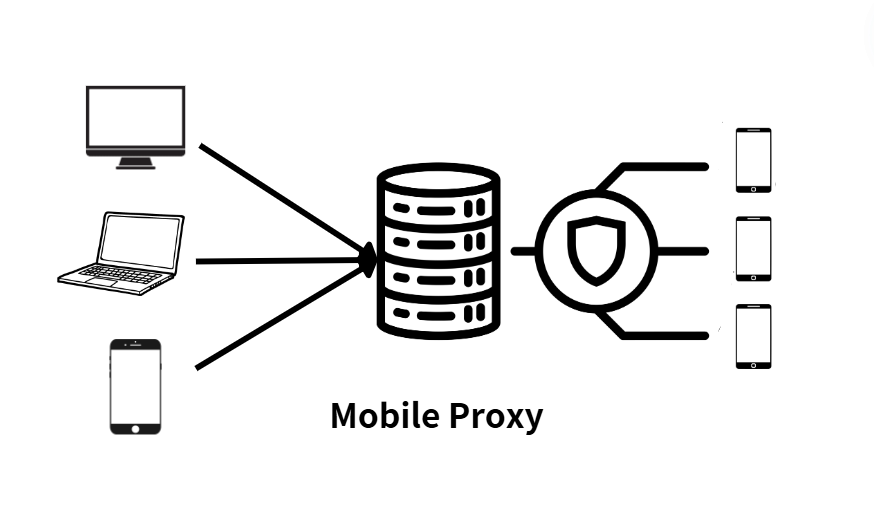The Beginner's Guide to Proxies: Mobile Proxies
 BrowserScan
BrowserScanWith the rise of online threats such as hacking and data breaches, securing both personal and business information has become crucial. In response, many are turning to proxy services, yet the concept of a "mobile proxy" remains unfamiliar to a broad audience.
This blog aims to illuminate the functions and benefits of mobile proxies, offering clarity on how they can enhance your online security and privacy.
What Is a Mobile Proxy?
A mobile proxy serves as a gateway that provides a mobile IP address instead of a residential or VPN IP address. This means that when using a mobile proxy, it appears as though you are accessing the internet through a mobile data network, effectively hiding your actual location.
Although similar in concept to residential proxies, mobile proxies differ significantly due to the architecture of mobile data networks. This makes them particularly attractive for individuals seeking to obscure their activities online, sometimes for dubious purposes.
It's important to clarify that mobile proxies use the IP addresses of mobile networks but are not limited to mobile phones or devices. Additionally, a mobile device does not use a mobile IP when it connects through a residential network, like home Wi-Fi.

Types of Mobile Proxies:
3G Proxy: Uses third-generation networks, best for basic tasks like web browsing due to slower speeds but cost-effective.
4G/LTE Proxy: Operates on fourth-generation networks, offering faster speeds and reliability for tasks like social media management and web scraping.
5G Proxy: Utilizes the fastest fifth-generation networks, ideal for high-bandwidth activities such as streaming high-quality video and online gaming.
SOCKS Mobile Proxy: Compatible across 3G, 4G, and 5G networks, uses the flexible SOCKS5 protocol suitable for various applications requiring versatile routing.
HTTP Mobile Proxy: Adapts to any mobile network generation, operates on HTTP for simple and efficient web traffic management.
How Does a Mobile Proxy Work?
Similar to residential proxies, mobile proxies function by assigning a mobile data network IP to any device using gateway software. This process starts when a device connects to a cell tower, which then provides an available mobile IP from its pool. This connection means multiple mobile IPs from the same network will often share the same tower.
It is possible to use a mobile proxy from a device that is not a mobile phone or tablet. Devices not traditionally mobile, like desktops, can also use mobile proxies if they have the right hardware, such as a mobile dongle that can read SIM cards.
Mobile proxies are linked with mobile carriers, giving them access to a vast array of IP addresses that can reach into the thousands. A key aspect of mobile proxies is their shared IP addresses, which can be beneficial for users wanting to disguise their online activities. These IPs are rotated frequently by the network, enhancing anonymity online.
Pros and Cons of Mobile Proxies
Pros:
Realistic Interaction: Mobile proxies act like real users, making your online actions look natural and less likely to be flagged as suspicious.
Reduced IP Blocks: Carrier-Grade Network Address Translation (CGNAT) allows several users to share one public IP address, effectively concealing their actual IP addresses. This sharing of a single IP address complicates the task for websites to pinpoint and block individual users based on IP identification.
Speed and Responsiveness: They tap into cellular networks for fast, smooth web interactions with minimal delay.
IP Rotation: With options for manual or automatic IP changes, these proxies help avoid IP-based bans.
Protocol Support: Mobile proxies handle various protocols including HTTP, HTTPS, and SOCKS, suiting different internet needs.
Cons:
Higher Costs: Mobile proxies tend to be pricier than datacenter or residential proxies. The cost of getting mobile IPs from providers can be high, particularly for extensive or long-term use.
Signal Dependence: The performance of mobile proxies can fluctuate with the mobile network signal strength. A weak signal might limit bandwidth, causing slower and less stable connections.
Limited Proxy Locations: There are generally fewer location options for mobile proxy IPs compared to those available through datacenter proxies.
Despite these drawbacks, mobile proxies are still considered highly effective in situations where genuineness, reduced detection risks, and access to mobile-specific content are critical. It is essential to weigh your specific requirements and limitations carefully when choosing if mobile proxies are the right option for your needs.
Is Mobile Proxy Different from Other Types of Proxy?
Yes, mobile proxies have some marked differences from other types of proxies, which come from the way cell carriers assign IP addresses to mobile devices.
Datacenter Proxy vs Mobile Proxy
Datacenter proxies are sourced from servers housed in data centers. They are not tied to any specific device and are abundant, making them a common choice for both businesses and individuals. However, they often face issues, such as being marked as suspicious and easily blocked by websites because they aren't linked to a real user's device. Their frequent use in spamming and fraudulent activities also makes them susceptible to being blocked.
In contrast, mobile proxies are connected to actual mobile devices and utilize the IPs provided by mobile network operators. This association with real, moving devices makes mobile proxies less likely to be identified and blocked. Mobile proxies also have the added benefit of being more secure since they use the device’s encryption protocols to protect data.
Residential Proxy vs Mobile Proxy
Residential proxies use IP addresses assigned by Internet Service Providers (ISP) to devices within a home network. These proxies typically have access to a larger pool of IP addresses compared to mobile proxies, which can be advantageous depending on the application.
When deciding between mobile and residential proxies, consider your main requirements. If you need enhanced security and a lower risk of being blocked, mobile proxies are usually more effective. On the other hand, if your priority is accessing a wide range of IP addresses, residential proxies might be the better choice.
It's worth noting that mobile proxies tend to be more expensive due to their limited numbers and higher demand. In contrast, residential proxies are generally more affordable and easier to obtain, making them a practical option for many users.
Use Cases
Mobile proxies use cellular network's infrastructure to route your internet traffic. This allows you to appear as a mobile user, even on non-mobile devices. Because of this, mobile proxies are very dependable and widely used in both business and personal settings.
Web Scraping
Web scraping is a common application for mobile proxies. These proxies provide a reliable way to gather and analyze data from different websites, useful for market research and SEO monitoring. Mobile proxies help avoid being blocked while scraping, thanks to their high quality and CGNAT technology.
Social Media Management
Companies use mobile proxies to manage and automate their social media efficiently, handling several accounts at once. These proxies make it easy to connect with audiences automatically, ensuring quick responses and consistent content updates across platforms. Additionally, using mobile proxies reduces the risk of accounts being banned or restricted, protecting your online presence.
SEO Monitoring
Mobile proxies help companies track their website's search engine rankings and optimize their content. This includes checking keyword rankings and competitor performance.
Ad Verification and Fraud Prevention
Advertisers use mobile proxies to monitor the accuracy and credibility of their ad campaigns by tracking the locations of ads, along with their impressions and clicks.
They can detect and prevent ad fraud by analyzing traffic patterns, IP addresses, and user behavior. This helps guard against false reporting and inflated metrics, which may occur from bots generating fake clicks and conversions.
Automation
Mobile proxies facilitate the automation of various online activities. They are used to deploy APIs and other automation tools that reduce the need for manual input, enhancing efficiency in tasks like social media and content management.
Price Comparison and Monitoring
This is particularly useful in e-commerce and ticketing, where businesses need to keep track of competitors’ prices. Mobile proxies enable both businesses and consumers to compare prices on different platforms, ensuring competitive pricing and helping shoppers find the best deals.
Conclusion
Mobile proxies effectively utilize cellular technology from 3G, 4G, and 5G networks to provide stable, secure, and high-speed internet access. These proxies are instrumental for tasks like web scraping, social media management, and security testing, as they closely mimic real user behavior.
Additionally, tools like BrowserScan play a critical role in detecting bot activities. With a bot detection tool, it can check scripts to see if they act like bots and give helpful feedback if the scripts don't pass the test. This helps people improve their automated scripts, making sure they work better and without problems.
Subscribe to my newsletter
Read articles from BrowserScan directly inside your inbox. Subscribe to the newsletter, and don't miss out.
Written by

BrowserScan
BrowserScan
Am I 100% anonymous? Check your browser fingerprints and IP address to find how your online identity looks👉www.browserscan.net